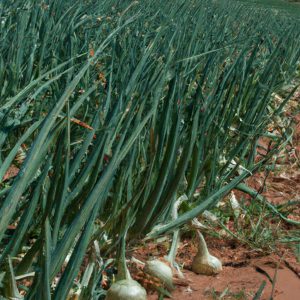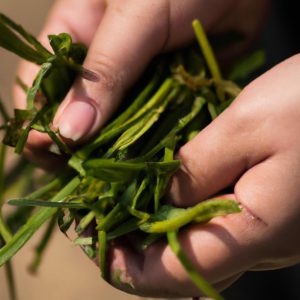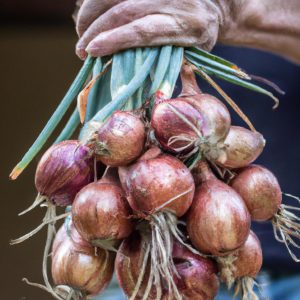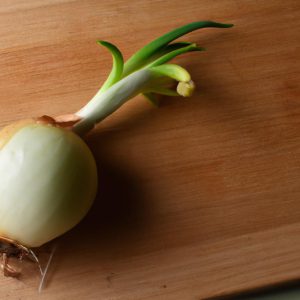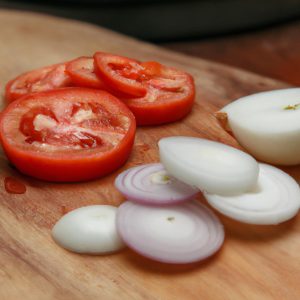As a new parent, it can be challenging to navigate the many do’s and don’ts of caring for your baby. One common concern that new mothers often have is whether their dietary choices can affect their baby’s digestion. In particular, many mothers wonder if eating onions can cause gas in their breastfed babies.
In this article, we’ll explore the link between onion consumption and infant gas. We’ll take a closer look at the nutritional value of onions, how they affect the digestive system, and the scientific evidence linking onions to gas in infants. We’ll also provide tips for managing gas in breastfed babies and offer advice on maintaining a balanced diet while breastfeeding.
It’s essential to address this issue because many new mothers are unsure about what they can and cannot eat while breastfeeding. By understanding the relationship between onions and infant gas, mothers can make informed decisions about their diet and ensure their baby’s comfort. Let’s dive in!
Breastfeeding and Gas in Babies

Breastfeeding is an essential part of caring for a newborn baby. It provides all the necessary nutrients for the baby’s growth and development and helps build a strong bond between mother and child. However, breastfeeding can also cause gas in babies, which can be uncomfortable and distressing for both the mother and the baby.
Breastfeeding works by allowing the baby to suckle at the mother’s breast, where they receive a mixture of foremilk and hindmilk. Foremilk is the watery milk that is produced at the beginning of the feeding, while hindmilk is the thicker, fattier milk that is produced towards the end of the feeding. This combination of milk provides the baby with all the necessary nutrients and helps them feel satisfied.
Despite its many benefits, breastfeeding can also cause gas in babies. This is because breast milk is digested more easily than formula, which means that it moves through the digestive system more quickly. As a result, babies may swallow more air, which can lead to gas and discomfort.
Common causes of gas in breastfed babies include an improper latch, a fast let-down reflex, or an oversupply of milk. When the baby is not latched correctly, they may swallow more air while feeding. Similarly, a fast let-down reflex can cause the baby to gulp air while trying to keep up with the flow of milk. Finally, an oversupply of milk can cause the baby to take in more milk than they need, leading to gas and discomfort.
Onions and Gas

Onions are a staple ingredient in many cuisines around the world, known for their distinctive flavor and nutritional value. However, they are also known to cause gas and bloating in some individuals, including breastfed babies.
Nutritional value of onions
Onions are a rich source of vitamins and minerals, including vitamin C, vitamin B6, and potassium. They also contain dietary fiber and antioxidants that can help promote overall health. However, onions are also high in fructans, a type of carbohydrate that is difficult for some people to digest.
How onions affect the digestive system
When we eat onions, the fructans they contain pass through the small intestine undigested and enter the large intestine, where they are fermented by gut bacteria. This fermentation process produces gas, which can cause abdominal discomfort, bloating, and flatulence.
Scientific evidence linking onions to gas in infants
While there is limited research specifically on the relationship between onions and infant gas, studies have shown that breastfed babies can be sensitive to certain foods that their mothers consume. Onions are one of the foods that may cause gas in breastfed babies. If you notice that your baby is experiencing discomfort after you eat onions, it may be worth avoiding them and seeing if the symptoms improve.
In the next section, we’ll explore other foods that may cause gas in breastfed babies and offer tips for managing gas in infants.
Other Foods That May Cause Gas in Breastfed Babies

Breastfeeding mothers often have to watch what they eat to ensure their baby’s comfort and health. While onions are a common suspect when it comes to infant gas, there are other foods that may contribute to gas in breastfed babies. Here are some other culprits to watch out for:
Dairy Products
Dairy products contain lactose, a sugar that many babies have trouble digesting. If your baby is sensitive to lactose, consuming dairy products can cause gas, bloating, and discomfort. Some common dairy products to avoid include milk, cheese, and yogurt.
Cruciferous Vegetables
Vegetables like broccoli, cauliflower, and cabbage are high in fiber and can be difficult for babies to digest. When these vegetables break down in the intestines, they can produce gas, leading to discomfort and bloating.
Spicy Foods
Spicy foods can irritate the lining of the baby’s stomach, leading to gas and discomfort. If you enjoy spicy foods, it’s best to consume them in moderation or avoid them altogether while breastfeeding.
Caffeine
Caffeine can be passed through breast milk, and some babies may be sensitive to it. Consuming too much caffeine can cause irritability, restlessness, and gas in breastfed babies. It’s best to limit caffeine intake while breastfeeding.
By avoiding these foods, you may be able to reduce your baby’s gas and discomfort. However, it’s important to note that every baby is different, and some may be more sensitive to certain foods than others. If you’re unsure about which foods to avoid, talk to your doctor or a lactation consultant for personalized advice.
Tips for Managing Gas in Breastfed Babies
Breastfed babies are prone to gas, and it can be challenging for new parents to manage their baby’s discomfort. Fortunately, there are several techniques that can help relieve gas in babies:
Techniques to help relieve gas in babies
- Burp your baby: Make sure to burp your baby after each feeding to help release any air that may have been swallowed.
- Massage your baby’s tummy: Gently massage your baby’s tummy in a clockwise motion to help move any gas through the digestive system.
- Change feeding positions: Experiment with different feeding positions to see if one is more comfortable for your baby and helps relieve gas.
- Use a warm compress: Applying a warm compress to your baby’s tummy can help soothe discomfort and relieve gas.
In addition to these techniques, it’s essential for breastfeeding mothers to maintain a balanced diet. A healthy diet can help improve the quality of breast milk and reduce the likelihood of gas in breastfed babies. Make sure to eat plenty of fruits, vegetables, and whole grains, and limit your intake of processed foods and sugary drinks.
Importance of a balanced diet for breastfeeding mothers
A balanced diet is essential for breastfeeding mothers because the nutrients in breast milk come directly from the mother’s diet. Eating a healthy diet can help ensure that your baby receives all the necessary nutrients for growth and development. It can also help reduce the likelihood of gas and other digestive issues in breastfed babies.
Finally, it’s important to know when to seek medical attention if your baby’s gas becomes severe or persistent. If your baby is crying excessively or seems to be in pain, or if you notice other symptoms such as vomiting or diarrhea, it’s essential to consult with a healthcare provider.
When to seek medical attention
- Excessive crying or signs of pain
- Vomiting or diarrhea
- Signs of dehydration
- Changes in feeding habits or weight loss
- Other symptoms of illness
By following these tips and techniques, breastfeeding mothers can help manage gas in their babies and ensure their comfort and well-being. Remember to maintain a balanced diet, experiment with different feeding positions, and consult with a healthcare provider if necessary.
Conclusion
In conclusion, it is clear that onions do have the potential to cause gas in breastfed babies. While onions are a nutritious food that can provide many health benefits, they can also cause discomfort for some infants. It’s essential to be mindful of your diet while breastfeeding and to pay attention to any signs of discomfort in your baby.
If you find that onions or other foods are causing gas in your baby, there are several things you can do to help manage the issue. Techniques such as burping, massage, and gentle movement can help relieve gas, and a balanced diet can help reduce the likelihood of gas in the first place.
At onionfacts.com, we believe in providing accurate and trustworthy information about the foods we eat. By understanding the link between onions and infant gas, mothers can make informed decisions about their diet and ensure their baby’s comfort. If you have any concerns about your baby’s digestion or overall health, be sure to consult with your healthcare provider.

